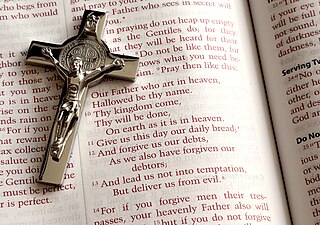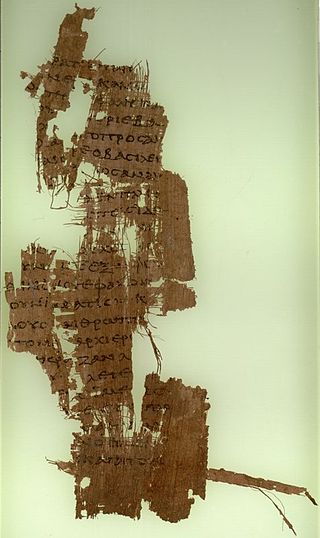
Matthew 6:14–15 are the fourteenth and fifteenth verses of the sixth chapter of the Gospel of Matthew in the New Testament and is part of the Sermon on the Mount. These verses come just after the Lord's Prayer and explain one of the statements in that prayer.

John 19 is the nineteenth chapter of the Gospel of John in the New Testament of the Christian Bible. The book containing this chapter is anonymous, but early Christian tradition uniformly affirmed that John composed this Gospel. This chapter records the events on the day of the crucifixion of Jesus, until his burial.

Matthew 28:20 is the twentieth and final verse of Matthew 28, the twenty-eighth and final chapter of the Gospel of Matthew in the New Testament. This verse is part of the Great Commission narrative.

Matthew 28:9 is the ninth verse of the twenty-eighth chapter of the Gospel of Matthew in the New Testament. This verse is part of the resurrection narrative. Mary Magdalene and "the other Mary" are leaving the empty tomb of Jesus after encountering an angel, and in this verse they encounter the risen Jesus.

Matthew 28:17 is the seventeenth verse of the twenty-eighth chapter of the Gospel of Matthew in the New Testament. This verse is part of the resurrection narrative, recording a meeting of the risen Jesus with the disciples.

Matthew 27:54 is the fifty-fourth verse of the twenty-seventh chapter of the Gospel of Matthew in the New Testament. This verse follows immediately after the death of Jesus and describes the reaction of the Roman soldiers present.

Matthew 7:29 is the twenty-ninth verse in the seventh chapter of the Gospel of Matthew in the New Testament. It ends a two verse conclusion following the Sermon on the Mount.

Matthew 9:7 is the seventh verse in the ninth chapter of the Gospel of Matthew in the New Testament.
Matthew 9:11 is a verse in the ninth chapter of the Gospel of Matthew in the New Testament.
Matthew 12:47 is the 47th verse in the twelfth chapter of the Gospel of Matthew in the New Testament.

Matthew 12:2 is the second verse in the twelfth chapter of the Gospel of Matthew in the New Testament.
Matthew 9:33 is a verse in the ninth chapter of the Gospel of Matthew in the New Testament.

Matthew 8:30 is the 30th verse in the eighth chapter of the Gospel of Matthew in the New Testament.

Matthew 8:33 is the 33rd verse in the eighth chapter of the Gospel of Matthew in the New Testament.
Family E is a textual group of the New Testament manuscripts. It belongs to the Byzantine text-type as one of its textual families, it is one of the primary early families of the Byzantine text-type. The name of the family came from the symbol of Codex Basilensis, the lead manuscript of the family, which is designated by symbol E.
Textual variants in the New Testament manuscripts arise when a copyist makes deliberate or inadvertent alterations to the text that is being reproduced. Textual criticism of the New Testament has included study of its textual variants.
Textual variants in the Gospel of Mark are the subject of the study called textual criticism of the New Testament. Textual variants in manuscripts arise when a copyist makes deliberate or inadvertent alterations to a text that is being reproduced. An abbreviated list of textual variants in this particular book is given in this article below.
Textual variants in the Gospel of Luke are the subject of the study called textual criticism of the New Testament. Textual variants in manuscripts arise when a copyist makes deliberate or inadvertent alterations to a text that is being reproduced. An abbreviated list of textual variants in this particular book is given in this article below.
Textual variants in the Acts of the Apostles are the subject of the study called textual criticism of the New Testament. Textual variants in manuscripts arise when a copyist makes deliberate or inadvertent alterations to a text that is being reproduced. An abbreviated list of textual variants in this particular book is given in this article below.

John 20:20 is the twentieth verse of the twentieth chapter of the Gospel of John in the New Testament. It contains the reaction the disciples to Jesus' first appearance after his resurrection and Jesus showing his hands and his side.











